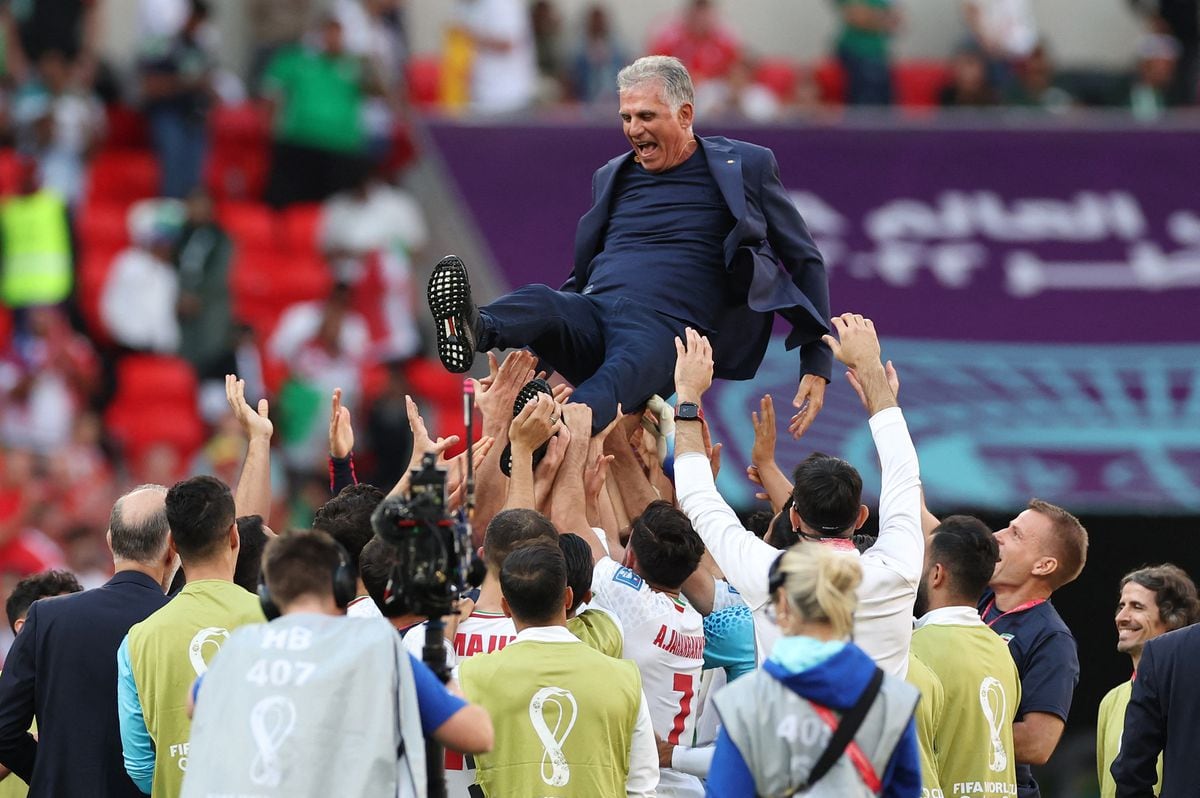The Iranian team arrived in Doha and at the hotel they brought out a cake to mark the beginning of their World Cup.
They were also given a long knife, almost a sword, such as is used with wedding cakes, and with it they cut it.
Photos were taken, which circulated through the networks, and they immediately began to change.
In the manipulated images, bloody babies appeared under the knife in the place of the cake.
At the time, Iran's footballers were considered traitors by the part of the country that continues to protest against the regime after the death of 22-year-old Mahsa Amini in September.
She was arrested by the moral police for wearing the hijab wrong, they left her in a coma and she died.
This sparked a powerful women-led protest movement that was met with a violent response from the regime.
The Norway-based NGO Iran Human Rights (IHR) says the Revolutionary Guards have killed at least 461 people.
There have been more than 10,000 arrests.
The anger of the demonstrators against the soccer players is explained from Oslo by Mahmood Amiry-Moghaddam, director of IHR.
Before traveling to Qatar, they attended a meeting that stirred them up: "They went to see the president, Ebrahim Raisi, and the images of them there, talking to him and smiling, caused many Iranians to turn against the team."
The pressure that they already felt, despised by part of their people, became more acute when they began their activity in Doha and English journalists appeared at their camp.
His questions placed the footballers daily in the face of demonstrating in public about the protests.
In their careful answers, they alluded to the discontent of the town: they also wanted them to be better, but they preferred to talk about soccer.
The press insisted, and one morning one of the Iranian envoys ostensibly began to photograph the small audience in the barracks.
Iranian journalists also do not like questions about the relationship between the gestures of soccer players and the repression of protests in their country.
“I just want to talk about sport,” said one this week at the Al Rayyan training center.
And he was pointing to another who might want to answer.
But the other did not want to talk about "political and social" issues either.
Same as next.
According to Amiry-Moghaddam, the regime has controlled the list of special envoys.
Some of those in Doha have acted as a cover for the Westerners, saying several times that these issues were unfair, and asking Queiroz if he saw it as correct.
The Portuguese coach always defended the freedom of journalists, but regretted his insistence.
After a particularly intense appearance, he had a brief discussion with a BBC journalist whom he encouraged to ask Southgate, the England coach, about Afghanistan.
The question of whether they would sing the anthem before playing against England also arose, something that was requested from the protests.
They avoided answering, but when the notes were played in the Khalifa Stadium they did not open their mouths.
A part of his fans booed the anthem.
Another booed them.
In Iran, the division was similar, and the protesters found it insufficient, according to Amiry-Moghaddam: “That they didn't sing the anthem didn't impress anyone.
Under normal circumstances it would have.
Not singing it is important, and it's brave.
But now it didn't seem like enough."
They find themselves trapped in a devilish situation.
Stop singing the hymn angered some and did not please others.
"There were videos of people in Iran celebrating England's third goal," says the IHR director.
They expected more from the footballers, despite the fact that many have their families and friends in the country.
"They are much more protected than those who go out into the streets," says Amiry-Moghaddam.
the surrender of the bracelet
The part of their country that is being repressed wants them to rise up and become heroes and the Western media insist on them expecting gestures at the same World Cup in which seven European teams gave up the rainbow bracelet when FIFA threatened them with a yellow card.
For them the tension is crushing.
Nothing is enough.
Some have written messages of explicit support, like Azmoun, who plays for Bayer Leverkusen.
Meanwhile, Queiroz insists that "they are only boys who want to play soccer."
Under that pressure, England passed them over (6-2).
The players seemed gone.
And in a way they were.
Striker Taremi summed it up before playing against Wales: "The first game was not football, for all the surrounding issues."
In the hours before that second meeting, the pressure was maintained.
Some media reported brawls between Iranian fans for and against the regime in the vicinity of the stadium.
The players did sing the anthem, and they heard whistles from the stands.
But Iran was more like itself.
They won 0-2, and after each goal the players on the bench went in to celebrate almost as far as the area.
It was an extraordinary release.
In the end they went around the field applauding the stands, giving away T-shirts and taking selfies with the phones that were thrown at them from the stands.
Cheshmi, best of the match, let off steam at the end: "In the first game, there was a lot of pressure on the team," he said.
“If the pressure has to do with the game, it is normal.
Things happened with the players that were not fair.
We receive pressures that have nothing to do with football”.
Subscribe here
to our special newsletter about the World Cup in Qatar

